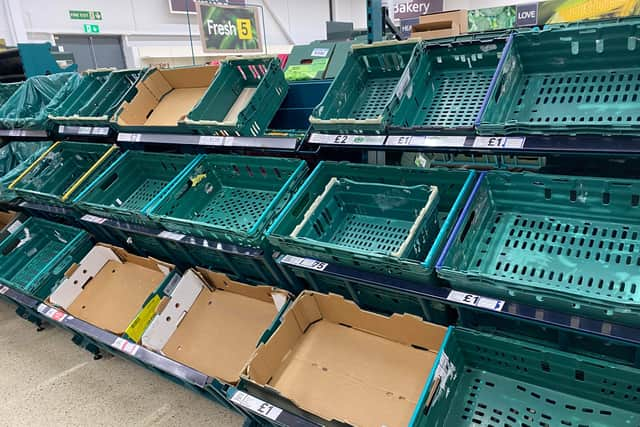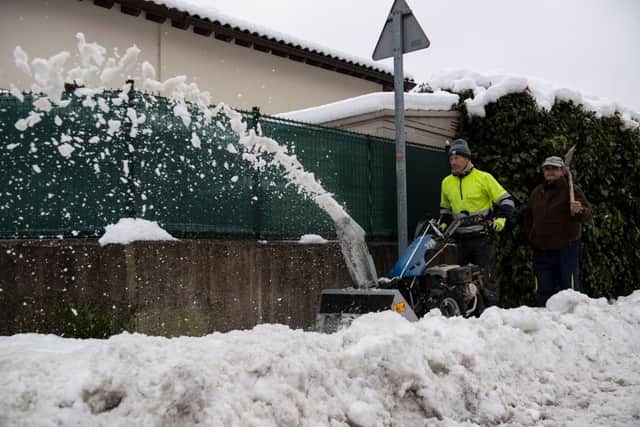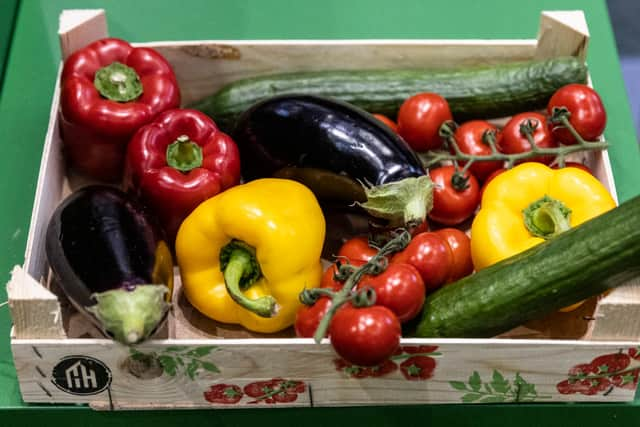UK food shortages to last ‘beyond Easter’ after Spain and Morocco weather issues - affected products explained
and live on Freeview channel 276
The UK looks set to face empty shelves in supermarket fresh produce aisles until April following poor weather conditions in Spain and Morocco.
Unseasonably warm temperatures in the New Year have been followed by freezing conditions and extreme wind and rain storms in the two countries. These unusual weather events have ruined crop cycles and, according to one industry figure, have driven up wholesale food prices by half in some instances. These issues have been compounded by transportation difficulties and a lack of European glasshouse production as a result of the energy crisis.
Advertisement
Hide AdAdvertisement
Hide AdThe situation has seen many of the UK’s biggest supermarkets start restricting purchases of fresh produce items. Tesco, Aldi, Asda and Morrisons are all limiting the number of purchases consumers can make on several key fresh produce items, including tomatoes, peppers and cucumbers.
It isn’t the first time poor weather in Spain has led to major disruption in UK food retailers. In January 2017, what became known as the ‘courgette crisis’ saw packs of the vegetable disappear from shelves and prices soar for consumers when they became available again. A similar scenario occurred in February 2021.
The UK is particularly vulnerable to fresh produce shortages at this time of year due to it being the period when UK and northern European food production is at its lowest across most types of fruit and vegetables. Most domestic farms tend not to undertake meaningful harvesting of most crops until late spring.
What has happened in Spain and Morocco?
During the winter months, Spain and Morocco are vital sources of everything from strawberries to aubergines. They are known in the industry as Europe’s breadbaskets at this time of year.
Advertisement
Hide AdAdvertisement
Hide AdBut both countries have seen wild variations in temperatures and weather in recent weeks. Over the New Year period, record heat was seen in Spain, with temperatures hitting 24.9C in Bilbao - a situation which led to a glut of salad and fruit crops.


Soon afterwards, temperatures plummeted into the low double figures - even dropping below freezing at night - while cloud cover meant there was limited sunshine. It has stunted the growth of the remaining crops, creating a supply crisis.
A source in the fresh produce industry told NationalWorld that during a visit to Spain last week, the weather was still cold and that there was “no sun all week” - bright weather also being key to growing crops. Conditions are understood to have been closer to normal this week but are set to plummet once again over the weekend.
The source also suggested that climate change was becoming an increasing issue in the European country. “There are more and more extreme weather patterns, with temperatures going from hot to cold very rapidly,” they said. “We don’t get the staged seasonality we used to have.”
Advertisement
Hide AdAdvertisement
Hide AdMeanwhile, similar weather issues in Morocco were compounded by flooding, hail, and wind storms. The latter has meant ferries have been unable to sail, which has prevented supplies from reaching Europe.
Which products are affected?
While the focus initially fell on tomato shortages, a wide variety of fresh produce is in short supply.
The previously quoted industry source told NationalWorld that citrus (including oranges and lemons), brassicas (such as broccoli and cauliflower) and salad crops (cucumbers, lettuce and tomatoes) had all been impacted.
According to Spanish growers association FEPEX, in the key growing region of Almeria, volumes of tomatoes, cucumbers, peppers and aubergines are down by more than a fifth year-on-year. Courgettes have also been affected, albeit to a slightly lesser extent.


How long could fresh produce shortages last?
Advertisement
Hide AdAdvertisement
Hide AdSpeaking to NationalWorld, Nigel Jenney of the Fresh Produce Consortium - a trade body representing the UK’s fruits, vegetables and flowers supply chain - said he expects “usual levels of availability” in stores to not recover until “beyond Easter”.
He said the weather issues in Spain and Morocco were being compounded by labour shortages, high packaging costs and rocketing production costs. On the latter of these, Mr Jenney said early season production in Dutch glasshouses was “probably in the region of 80% down” as a result of the soaring cost of energy in Europe in the wake of Russia’s invasion of Ukraine. This is becaProducing fresh produce in glasshouses during the winter months requires
According to Paul Rowe, head of procurement for salads and vegetables at Poupart Imports - an importer that supplies independent retailers and UK wholesalers - the situation is set to last for “several weeks”.
He said he expected things would remain “particularly tight” until next month when “new crops start to come out of Northern Europe”. He added that cucumbers grown in Dutch and UK glasshouses are appearing on the market, but tend to be of “poor quality and won’t last long” due to it being early in the season.
Advertisement
Hide AdAdvertisement
Hide AdBut while fresh produce supplies have undoubtedly tightened, Mr Rowe said it was the wholesale price dynamics that were driving the shortages. He spoke of instances of UK supermarkets refusing to pay more and “growers saying they will not be loading” their fruit and vegetables as a result.


“I have never seen prices like it,” he said. “Red and yellow peppers have been £5 per kilo - and that’s before markup. It’s £14 to £16 for cucumbers. Tomatoes are £14 a box but had been going for up to £17.
“There are massive lettuce shortages and iceberg lettuces are going for £1.40 a piece. All of these products are usually trading at half that value.”
He said consumers seeking out the affected fresh produce items may have a better chance of finding them in independent retailers where price is less of a factor.
Advertisement
Hide AdAdvertisement
Hide AdAndrew Opie, director of food and sustainability at the British Retail Consortium, which is a trade body that represents UK supermarkets, told the PA news agency: “Difficult weather conditions in the south of Europe and northern Africa have disrupted harvest for some fruit and vegetables including tomatoes and peppers.
“While disruption is expected to last a few weeks, supermarkets are adept at managing supply chain issues and are working with farmers to ensure that customers are able to access a wide range of fresh produce.”
Comment Guidelines
National World encourages reader discussion on our stories. User feedback, insights and back-and-forth exchanges add a rich layer of context to reporting. Please review our Community Guidelines before commenting.
